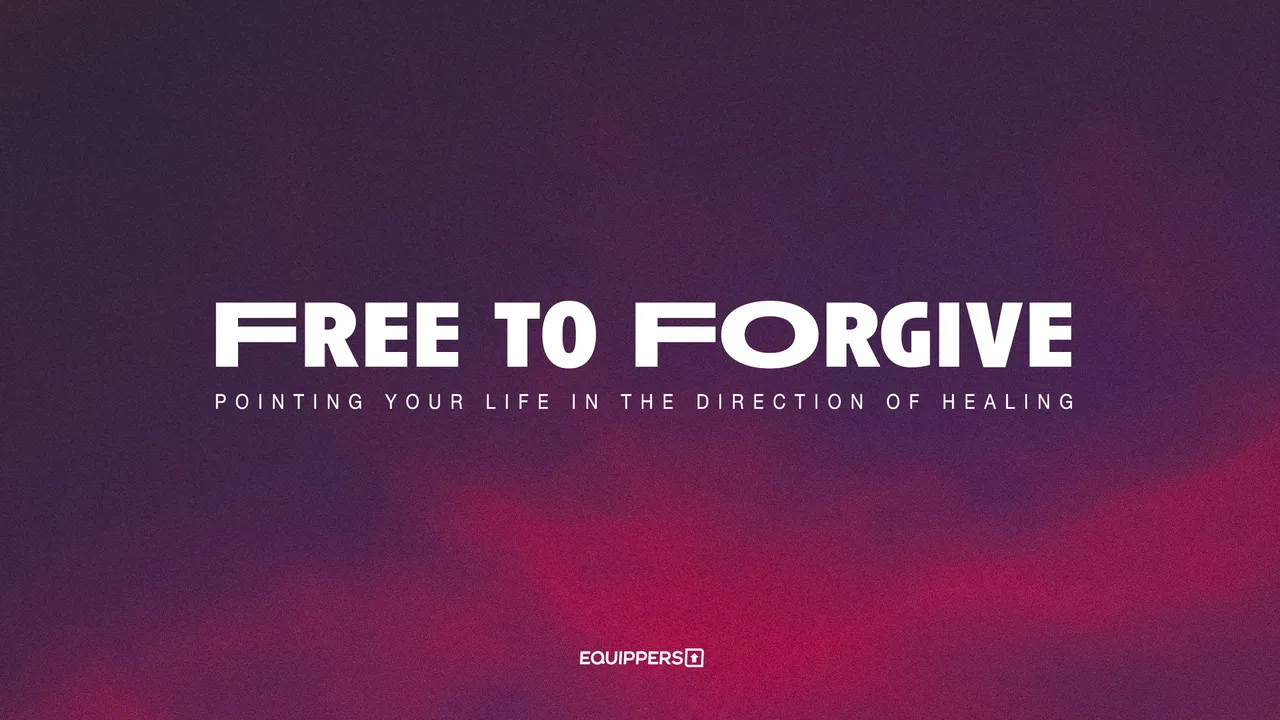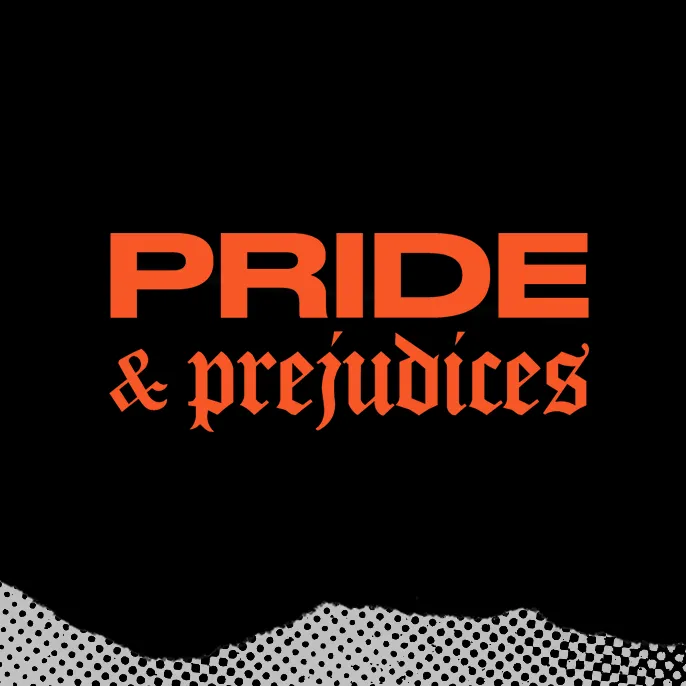Free to Forgive
In this 4 week series Ps Jake Langridge and Ps Hannah Marchant open up the topic of forgiveness. If we want to point our life toward healing, hope, peace, and possibility – a free life - it goes only by the pathway of forgiveness. Receiving God’s forgiveness, then freely offering that forgiveness to others and ourselves.

Week 1: Receiving Forgiveness
Key Thought: We find freedom as we accept His forgiveness.
Key Scripture: 1 John 1:8-9
“If we claim to be without sin, we deceive ourselves and the truth is not in us. If we confess our sins, he is faithful and just and will forgive us our sins and purify us from all unrighteousness.”
OPEN
Question 1
Q: What feelings and thoughts come to mind when you hear the word forgiveness?
STUDY
Before we can look at what it means to forgive others, we need to understand the forgiveness that has been offered to us. Forgiveness is a very central part of the Gospel. We all need forgiveness. We have all fallen short. We have all sinned.
Read these passages:
Romans 3:23
"For all have sinned and fall short of the glory of God.
Ecclesiastes 7:20
"There is not a righteous man on earth who does what is right and never sins."
The good news is that when we come to Jesus he forgives us of our sins. He says, “I know you’ve done some bad things. If you’ll let me, I can wipe the record clean…”
2 Peter 3:9
"…He is patient with you, not wanting anyone to perish, but everyone to come to repentance."
God desires to forgive us, so He provided for our forgiveness. Jesus paid the debt.
Forgiveness is at the foundation of Christ’s suffering and death on the cross.
One of the last things Jesus said while hanging from the cross were words of forgiveness...
Luke 23:34
“Then Jesus said, "Father, forgive them, for they do not know what they do.”
Question 2:
Q: What are some words that describe God’s forgiveness toward us?
Question 3:
Q: Can you remember your experience and what it felt like the first time you opened up your heart to Jesus and accepted His forgiveness?
Question 4:
Shame prevents us from enjoying intimacy with God, but God’s forgiveness covers our shame with the blood of Jesus.
Q: Is there anything in your life that you have hidden or are so ashamed of that you’ve been unwilling to acknowledge it and receive God’s forgiveness? Why do you feel that God can’t forgive you?
COMMIT
Question 5:
Receiving God’s forgiveness is not just a one-time event. We don’t just receive it on the day we gave our life to Jesus, but we daily need to receive this free gift of salvation and forgiveness.
Q: What does it look like for a Christian to deal to regret, guilt, and shame on a daily basis?
Question 6:
We need to learn that whether or not we feel forgiven, and whether or not we have forgiven ourselves, we are forgiven.
Q: What is the difference between trying to “forgive yourself” versus receiving God’s forgiveness?
PRAY
Pray that God will give us a fresh revelation of His forgiveness, and the ability to receive it so we have the freedom to forgive those who have hurt us.
PRACTICAL
This week, take some time to think about all the ways that God, in His abundant grace and mercy, has deleted your own sin. Thank Him for that!
Week 2: Forgiving Others
Key Thought: Freely forgive as you were freely forgiven.
Key Scripture: Colossians 3:12-13
“Since God chose you to be the holy people he loves, you must clothe yourselves with tenderhearted mercy, kindness, humility, gentleness, and patience. Make allowance for each other’s faults, and forgive anyone who offends you. Remember, the Lord forgave you, so you must forgive others.”
The MSG version says: “Forgive as quickly and completely as the Master forgave you.”
OPEN
Because God forgave us, He commands us to forgive. Forgiveness leads to freedom. But unforgiveness towards anyone or anything can leave us trapped, restricted, and not able to experience the freedom of God.
Forgiveness isn’t for others, it’s to heal you.
Question 1
Before healing can come, you must face the fact that you’ve been hurt.
Q: What is your initial reaction to the concept of forgiveness? Are there situations you have been holding onto that you haven’t wanted to face or find it hard to acknowledge the hurt in?
STUDY
There is a lot of scripture that strongly commands us to forgive…
Matthew 6:14-15
“For if you forgive others their trespasses, your heavenly Father will also forgive you, but if you do not forgive others their trespasses, neither will your Father forgive your trespasses.”
Mark 11:25
“And whenever you stand praying, forgive, if you have anything against anyone, so that your Father also who is in heaven may forgive you your trespasses.”
Luke 6:37
“Judge not, and you will not be judged; condemn not, and you will not be condemned; forgive, and you will be forgiven.”
Question 2:
The world we live in gives us permission to cling to our resentment, broken relationships, and unresolved conflicts, but the Word of God gives us a higher standard.
Q: What does it look like to follow in God’s steps and walk the road of forgiveness? How is this different to how the world processes hurt?
Question 3:
We can choose to be offended and make a friend out of your hurt, feed it, and protect it until it destroys you and others. Or you can choose to bring your hurt to God.
Q: Why do you think we are sometimes content to wallow in self-pity when the release of forgiveness is available?
Question 4:
Unforgiveness is like a game of tug-of war. Because of pride, resentment, or bitterness, we hold on to the rope, jerking it back towards us hoping to “win”. Until you are willing to let go, you are a prisoner of the emotional war, hurting yourself further the longer you hold on. When you let go by forgiving, you can find freedom.
Q: Until you let go, what are the effects on you? How are you in a stand-still in your relationship with God until you forgive?
Holding onto unforgiveness can develop into bitterness, and bitterness hurts us. At the beginning, bitterness feels like it is a protective barrier so you don’t hurt again. But bitterness doesn’t just want to be a feeling, bitterness wants to be your only feeling. Bitterness doesn’t just want to move into your heart - it wants to take over your heart.
The enemy doesn’t want us to move closer and closer to healing. The enemy wants us stuck in our hurt, pain, and bitterness. He knows how harmful it is to us.
COMMIT
It never seems the right time to forgive – sometimes we even enjoy holding onto that hurt and replaying it over and over, and retelling it to people – but the perfect time to forgive is when we decide we want to heal. We can’t attach our healing to someone else’s choices.
Question 5:
When it comes to forgiveness, all of us are beginners. No one owns a secret formula. As long as you are trying to forgive, you are forgiving. It’s when you no longer try that bitterness sets in.
Q: Is there a situation or person you have stopped trying to forgive that you feel the Holy Spirit putting his finger on today?
Question 6:
Every day we have opportunities to be offended. Healthy relationships consist of both high’s and low’s and require us to keep short accounts and talk to the person we have issue with rather than talking to other’s about it.
Proverbs 19:11 says “A man’s wisdom gives him patience; it is to his glory to overlook an offense.”
Q: How are you doing in this area of keeping short accounts and overlooking day to day offenses?
PRAY
It takes considerable courage to examine your heart, but ask God to help you reflect on any areas where you are holding onto unforgiveness. Ask God to free, encourage, and heal your heart.
PRACTICAL
A good question to ask yourself when feeling or remembering hurt this week: In light of the cross, how should I see this hurt?
Week 3: Forgiveness is a Process
Key Thought: Forgiveness is a decision and a process.
Key Scripture: Matthew 18:21-22
“Then Peter came to Jesus and asked, “Lord, how many times shall I forgive my brother or sister who sins against me? Up to seven times?”
Jesus answered, “I tell you, not seven times, but seventy-seven times.”
OPEN
This week we want to talk remind you that forgiveness isn’t just a one-time event, there is also a process to walking out forgiveness and our healing.
Important notes to remember before we proceed:
- For some of you there is hurt that you are dealing with that you never deserved. We are sorry you have had to walk through some things that have not been fair or easy.
- For those who have been hurt deeply by another…it’s so important that you realise that we are talking about forgiveness, not justifying an abuser’s behaviors, and not allowing that person to keep hurting you. Setting boundaries is important. But forgiving them is also important. Like we talked about last week… forgiveness is not to free them. It is to free and heal you. You deserve to stop suffering because of other people’s wrongdoings.
- Whether or not reconciliation happens or is helpful for you, forgiveness is about you and God. Reconciliation requires two people doing the hard and humble work of coming back together. Sometimes that is possible, but sometimes it is not and reconciliation is not the goal, nor would it be healthy for you. But redemption is always the goal. Redemption with God is just between you and God. You can have a redemption story starting today.
Question 1:
We are often afraid if we start the pathway of forgiveness that is us saying that what happened didn’t matter, and it did matter.
Q: What else makes it hard to forgive?
STUDY
Matthew 18:21-22
“Then Peter came to Jesus and asked, “Lord, how many times shall I forgive my brother or sister who sins against me? Up to seven times?”
Jesus answered, “I tell you, not seven times, but seventy-seven times.”
Question 2:
We make a decision to be biblically obedient to God and in a moment we choose to forgive a person. But then a week or month later, something happens and we get triggered in that pain. Every time someone hurts us, there is a fact of what happened, and then there’s the emotional impact. What happens is we misunderstand that forgiveness is both a decision and a process.
Q: How have you seen this play out in your own life?
COMMIT
Question 3:
When those feelings of bitterness, resentment, and pain come back on us, that’s not an indication that our forgiveness wasn’t sincere or that we are a forgiveness failure. What that means is now we are recognising the impact that the whole event had on us, and it’s time for another marked moment of forgiveness.
Q: Are there any situations in your life requiring another marked moment of forgiveness?
Question 4:
Forgiveness is not a one-time crisis experience, but rather, a way of life. Time doesn’t naturally heal all wounds. It’s what you do with that time that determines whether you will point your life in the direction of healing or continued hurting.
Q: What does a lifestyle of forgiveness look like?
Question 5:
Don’t wait until the next offense to determine how you will respond. How much better, when you are in the middle of a hurtful circumstance, to know exactly how you will respond — as Jesus did, with compassion, patience, and forgiveness.
Q: What are some advanced decisions you can make about dealing with offense?
PRAY
Pray and tell God your desire for freedom in the areas where you are still hurting. Or if you feel at this point that you do not want to forgive those who have hurt you, admit your feeling to Him. He wants to work a miracle of grace in your life.
PRACTICAL
Take some time this week to consider the people or situations that have caused you the most hurt or have greatly offended you. Imagine forgiving that person, and write down what that would look like. If you struggle with this exercise, imagine that your circumstance happened to a friend. What would forgiveness look like if your friend forgave his or her offender?
Week 4: Forgiving Ourselves
Key Thought: If God can forgive you, then you can forgive you.
Key Scripture: Psalm 32:5 (NLT)
“Finally, I confessed all my sins to you and stopped trying to hide my guilt. I said to myself, “I will confess my rebellion to the Lord.” And you forgave me! All my guilt is gone.”
OPEN
Forgiveness can be one of the hardest things you have to do on your journey to peace and freedom. But forgiving yourself can be the hardest of all. Sometimes we hold ourselves to too high of an account. Where we would forgive others of something, we can’t forgive ourselves for the same thing.
Question 1:
Q: Do you have a tendency to replay past events in your mind like a merry go round – over and over? …only to be flooded with regret and shame?
STUDY
Romans 8:1
“There is therefore now no condemnation for those who are in Christ Jesus.”
Psalm 103:10-11
“He does not deal with us according to our sins, nor repay us according to our iniquities. For as high as the heavens are above the earth, so great is his steadfast love toward those who fear him.”
John 8:36
“If the son sets you free, you will be free indeed.”
Question 2:
The truth is, if God can forgive you (which He has) then you can forgive you. Who are you to hold something over yourself, if God, who is perfect and holy doesn’t hold it over you anymore?
Q: How can you apply the gospel truth from the above passages to mistakes you have made this past week?
Hebrews 12:1 - “So we must let go of every wound that has pierced us.... we look away from the natural realm and we fasten our gaze onto Jesus who birthed faith within us and who leads us forward into faith’s perfection.”
Question 3:
That verse “Let go of every wound that has pierced us” means “get rid of every arrow tip in us”. The implication is carrying an arrow tip inside, a wound that weighs us down and keeps us from running our race with freedom.
Q: Are you carrying any arrow tips, wounds of unforgiveness towards yourself, that you have carried for a long time?
Proverbs 28:13 - “Whoever conceals his transgressions will not prosper, but he who confesses and forsakes them will obtain mercy.”
Question 4:
God does not condone our sin. He does not enjoy our mistakes. But he will meet us in our place of brokenness and need every time we fail. He will offer us mercy and compassion every time we come to him in confession and repentance.
Q: Where do you need to forgive yourself today? What mistake or failure are you carrying around like a weight? Where are you not offering yourself the grace and mercy offered by your heavenly Father?
Question 5:
The internal bitterness that not forgiving yourself breeds is often times the root of some of the destructive choices that we’ve made to hurt ourselves and others.
Q: Can you see any destructive choices in your life as a result of not forgiving yourself?
COMMIT
Question 6:
In order to live in the freedom of self-forgiveness we need to:
- Spend time with God – Renewing your mind with the Word of God is literally cleaning the lens you view everything with… including yourself.
- Pray. Prayer can change your heart and help you with unbelief. If you’re going to disagree with God about your forgiven status – take it up with Him directly in prayer.
- Confess. Tell God where you feel shame and what you are feeling.
- Do a new thing. Also known as repenting. Repenting is turning away from the mistake or bad decision and asking God for His strength to help you in this area.
Q: Which of those 4 areas do you need to grow in currently? How can you practically do that this week?
PRAY
Acknowledge that there is nothing to gain by holding yourself in unforgiveness. Because Jesus died for your sins, accept His forgiveness. Thank Him for loving you and for His grace to move forward without regret, failure and shame.
PRACTICAL
Renew your mind with the Word of God. Ask God to share with you His perspective. Ask Him to help you see yourself as He sees you.


